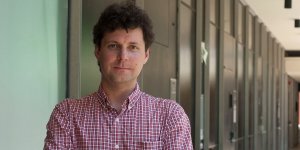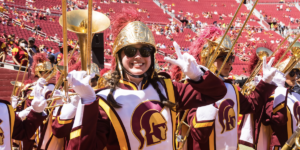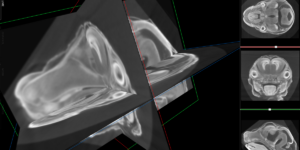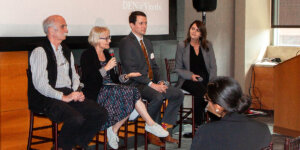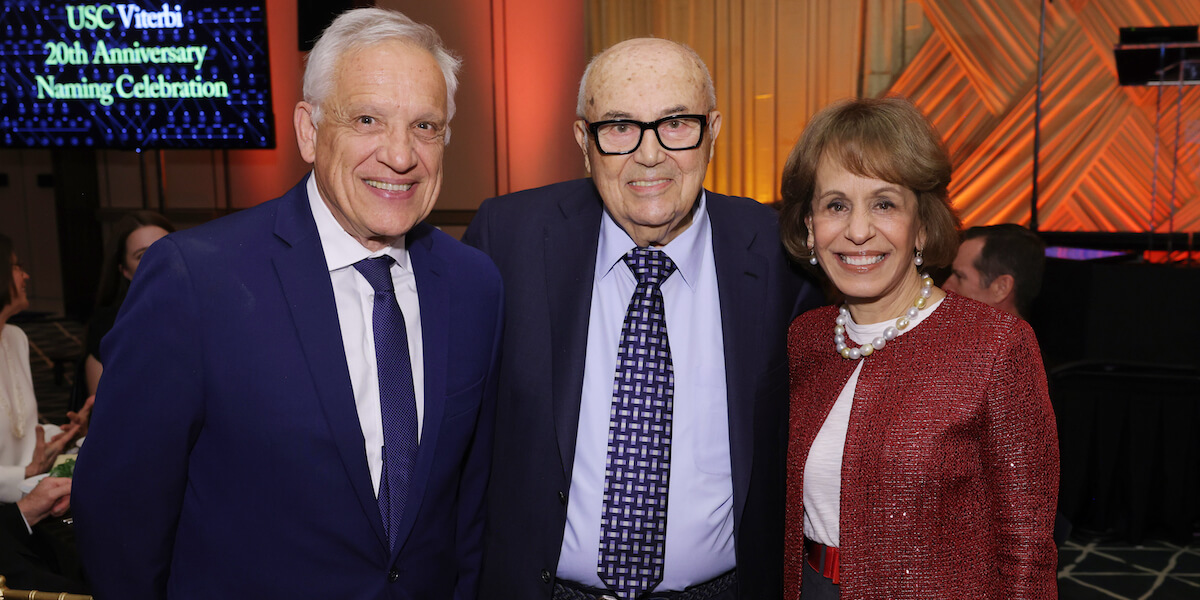
(Left to right) Dean Yannis Yortsos, Andrew Viterbi and USC President Carol Folt (Greg Grudt/ Steve Cohn Photography)
Twenty year ago, Andrew Viterbi, cofounder of technology powerhouse Qualcomm and inventor of the Viterbi algorithm, and his late wife Erna made the largest naming gift to an engineering school in history at that time. In the two decades since, the USC Viterbi School of Engineering reached new heights of academic excellence.
Over the past 20 years, four of its faculty members have won National Medals of Science and Technology; 28 faculty members of various affiliations have been inducted into the National Academy of Engineering, engineering’s most prestigious honor; 10 have been named MIT TR-35 recipients, with two additional students also earning this distinction; and 79 have won prestigious NSF Faculty Early Career Development Program (CAREER) Awards.
To honor Andrew Viterbi and his late wife Erna and recognize the continued impact of their support, USC recently held a 20th anniversary celebration of the couple’s naming gift. On Thursday, Feb. 29, USC President Carol L. Folt, USC Viterbi Dean Yannis C. Yortsos, and about 170 USC Viterbi students, friends, faculty, and staff honored Andrew Viterbi and his family at the Conrad Los Angeles for a night of memories.
Guests included USC trustee chair Suzanne Nora Johnson; USC trustees Dan Epstein, Ming Hsieh and John Mork and his wife Julie; Dr. Allen and Charlotte Ginsburg, the namesakes of the soon-to-open Dr. Allen and Charlotte Ginsburg Human-Centered Computation Hall; and Dean Emeritus Len Silverman, who was instrumental in welcoming Andrew Viterbi back to the engineering school by appointing him to the engineering school’s Board of Councilors.
A name that embodies excellence
USC President Folt said the Viterbi’s landmark gifts have had a profound impact on the university. “They have sparked dreams. They have sparked character,” she said. “They’ve sparked decades of achievement. They have and will continue to transform lives everywhere.”
In addition to the naming gift, in 2014, Andrew and Erna Viterbi gave USC Viterbi $10 million to endow five faculty chairs and five graduate student fellowships, the 10th anniversary of their donation. They also provided $5 million to endow the executive director chair at the Shoah Foundation.
Adding the esteemed Viterbi name to USC’s engineering school, Folt said, gave it “a reputation innovation, for bold thinking, for excellence, and above all for integrity.” It also provided USC Viterbi a “launchpad for the future.”
To cite but one example, Folt said that just as “the world was beginning to learn about AI, we were already launching our $1 billion Frontiers of Computing moonshot with a new School of Advanced Computing, within USC Viterbi, and creating the first Center for Generative AI and Society.”
“Most important, with all these new developments, especially in the area of AI, we’re putting ethics at the center,” she added.
Dean Yortsos said the engineering school embodies the best of both Andrew and Erna Viterbi.
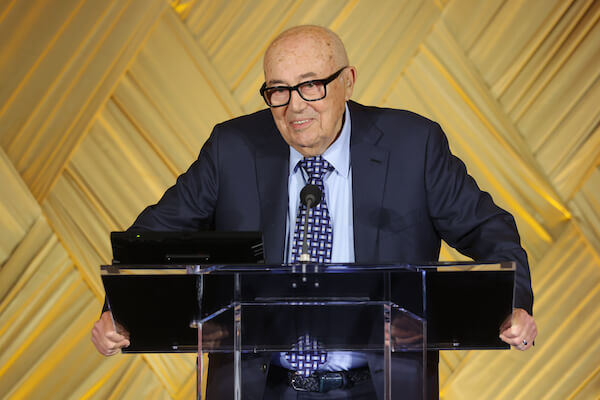
Andrew Viterbi, namesake of the USC Viterbi School of Engineering (Greg Grudt/ Steve Cohn Photography)
“Through his invention of the celebrated Viterbi algorithm in communications, which has been used in billions of cell phones, space communications, voice recognition, data recording, search, and DNA sequencing, Andrew has literally changed the world and brought the world together,” said Yortsos, referring to the mathematical formula Viterbi invented to eliminate signal interference, thus paving the way for the digital communications revolution. “Today, the Viterbi School is a place where students and faculty from all over the world mingle, interact, create, and advance the state of technology and engineering.”
Yortsos added that the success of Qualcomm, the San Diego-based manufacturer of semiconductor and wireless telecommunications products cofounded by Andrew Viterbi, has inspired legions of USC Viterbi students and faculty to launch myriad innovations and startups.
Like her husband, Yortsos said, the late Erna Viterbi was kind and welcoming to all, a true humanitarian. Her openheartedness has infused USC Viterbi with a spirit of inclusiveness.
“As dean of engineering for most of the 20-year span we are celebrating today, I got to know Erna a little bit. I always told her that she reminded me of many in my family,” he said “She was warm and welcoming, trusting and inspirational. We are very fortunate that this engineering school explicitly carries her name.”
“Even though I cannot prove it mathematically, I am convinced that it is this affiliation that underlies many of the gains we have made these past years,” Yortsos added. They include “attracting a gender-balanced entering class for five years since 2019, the almost ten-fold increase in women faculty since 2004, and our commitment to welcoming and including students from all over the world, building an environment of trustworthiness, one that combines outstanding technical excellence with outstanding character.”
When the Viterbis made their historic gift in 2004, C.L. Max Nikias, then dean of USC engineering’s school, predicted that the unprecedented support would transform the school.
“The innovative Viterbi spirit will inspire a new generation of engineers and catapult the Andrew and Erna Viterbi School into the uppermost echelon of engineering schools,” he said.
Indeed, it has.
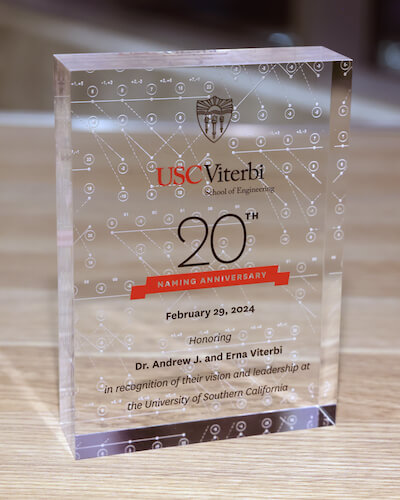
A plaque was awarded to Andrew Viterbi at the celebration in honor of his and his late wife Erna’s naming gift (Greg Grudt/ Steve Cohn Photography)
At the ceremony, President Folt and Dean Yortsos presented Andrew Viterbi with a plaque to commemorate the 20th anniversary of the naming gift.
Addressing the audience, Viterbi said his affiliation with USC began more than six decades ago when he began his graduate studies at Troy at age 22. “We’ve come a long way in these 66 years or so,” he quipped.
Viterbi said he has enjoyed his longtime relationship with USC, including serving on the university’s Board of Trustees and USC Viterbi’s Board of Councilors.
“There are many things that I very much appreciated at USC as a student and even more so over the half century or so that I’ve been associated with the school,” he said.
The Viterbi story
Andrew and Erna Viterbi’s both escaped from Europe’s fascism and virulent anti-Semitism to start anew in the United States. Andrew and his family left Italy for America just days before the Nazis invaded Poland in 1939. Erna and her family left their native Bosnia for Italy and then Switzerland before making their way to the U.S.
Andrew entered MIT in 1952. Four years later, he met Erna Finci, while on his first exploratory visit to Los Angeles. They soon married and started a family. With the Cold War heating up and Sputnik orbiting in the heavens, Andrew landed a position with the Jet Propulsion Laboratory. There, he specialized in the communications technology of “spread spectrum” systems on a team that designed the telemetry equipment for the first successful U.S. satellite, Explorer I.
In 1962, Andrew Viterbi earned one of the first doctorates in electrical engineering granted by USC. Just five years later, he published his first paper on the Viterbi algorithm, which has been used in space communications, voice recognition, data recording, search, DNA sequencing and even HBO’s satellite beaming of “The Sopranos.” In 1985, he cofounded Qualcomm.
Andrew Viterbi has received a raft of awards for his groundbreaking discoveries, including the NAE Charles Stark Draper Prize for Engineering, the IEEE Medal of Honor and IEEE Alexander Graham Bell Medal, the National Medal of Science, the Marconi International Fellowship Award, and the Benjamin Franklin Medal in Electrical Engineering, as well as several honorary doctorates. He is a member of the National Academy of Engineering, the National Academy of Sciences, and the American Academy of Arts & Sciences.
At every step of the way, Erna Viterbi supported her husband, helping him to reach his dreams and usher communications into the digital age. She also created a loving household that allowed their three children to thrive. Erna died in 2015 at 81.
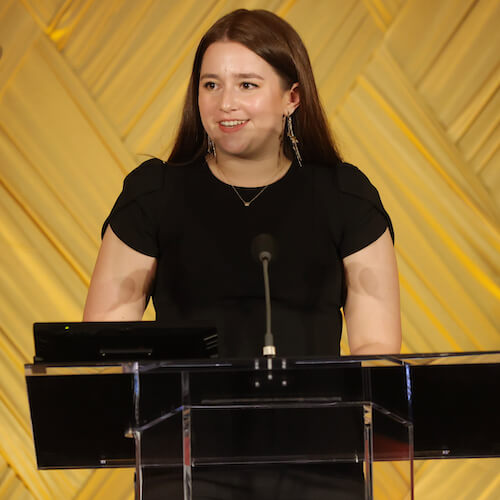
Student speaker Madeline Fujimoto (Greg Grudt/ Steve Cohn Photography)
Student speaker Madeline Fujimoto, a master’s student in structural engineering in the progressive degree program who recently earned her bachelor’s at USC Viterbi, spoke about her extraordinary journey at the school. Over the years, she has been an active Trojan as chair of the Women in Engineering program and as a Viterbi Student Ambassador.
“Engineering is a difficult field, but it is so much easier when you surround yourself with others who are supportive, collaborative, and inspire you to be the best you can be. USC Viterbi has provided me with an incredible number of people that uplift, support, and motivate me in all of my endeavors,” Fujimoto said. “The supportive family I found here has been instrumental in my journey, in helping me to succeed in both my academic and professional careers.
“Dr. Viterbi, your generosity has made my education possible and contributed to who I am and will be as an engineer in today’s world,” she added. “Thank you for supporting a school that encourages, enables, and supports incredibly passionate engineers.”
Published on March 7th, 2024
Last updated on March 7th, 2024





